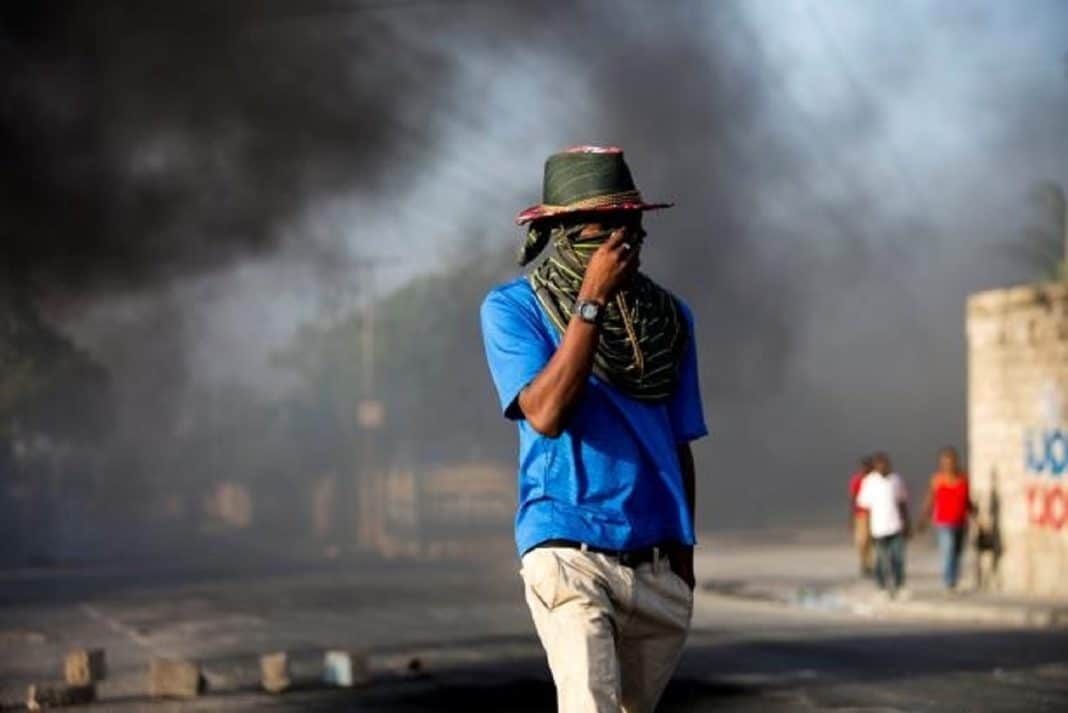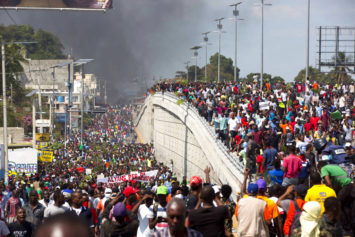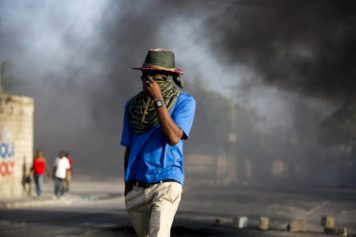
Protests erupted in Haiti following the government announcement of the elimination of fuel subsidies and dramatic price increases for gasoline, diesel and kerosene at the behest of the IMF. Haiti’s capital Port-au-Prince was shut down in light of a general strike. Although the government rescinded the price hikes, the protests continued. (AP Photo/Dieu Nalio Chery.)
On Monday, workers in Haiti shut down the capital of Port-au-Prince as protests were held across the country against austerity measures in the Caribbean nation. The protests began Friday, as Haitians watched the World Cup game between Brazil and Belgium, when the government announced dramatic increases to fuel prices in connection with austerity measures imposed on behalf of the International Monetary Fund (IMF). Several people have been killed from the violence that followed, with luxury hotels targeted and airlines canceling flights to Haiti. Although fuel price hikes — which were canceled amid public pressure — precipitated the demonstrations, oil is only part of the story.
Calling for calm, Prime Minister Guy Lafontant temporarily halted the fuel price increases, which included a 38 percent hike for gasoline, 47 percent for diesel and 51 percent for kerosene, as CNN reported. “I ask for your patience because our administration has a vision, a clear program,” Lafontant said in an announcement on state television. In his statement, the leader defended the agreement with the IMF, which would have called for an end to public subsidies for petroleum products and would have provided the country with an initial $96 million in loans and grants from the IMF and World Bank. Lafontant said Haiti has the lowest oil prices in Latin America among non-petroleum producing nations. In neighboring Dominican Republic, which shares the island of Hispaniola with Haiti, oil prices are 43 percent higher.
Making the case for price hikes while Haitians were watching soccer, Finance Minister Jude Alix Patrick Solomon had argued the subsidies heavily burdened Haiti’s cash-hungry economy, and only 25 percent of Haitians had benefited from the lower prices.
Roads and intersections were barricaded, and store and car windows in the affluent sections of Port-au-Prince were reportedly smashed. “We understand your right to protest, to vindicate, but we do not understand violence,” said Haiti’s national police director Michel-Ange-Gedeon on the reported killing of a policeman. The director also reported that several police cars and at least two police stations were burned.
The U.S. Embassy in Haiti issued a warning to American citizens to stay inside during the protests. “Do not attempt to travel at this time. Avoid protests and any large gathering of people. Do not attempt to drive through roadblocks,” said a U.S. State Department Bureau of Consular Affairs official. The embassy has requested 13 additional Marines and other security personnel. The State Department issued a travel warning on July 9 urging people not to travel to Haiti.
Demonstrators and police clashed at the capital as protesters from political opposition groups marched on the parliament and were turned back, and as a general strike closed businesses and shut down the taxis and minibuses that people depend on for transportation, according to the Tampa Bay Times. Public Security Secretary Ronsard Saint Cyr and members of the Haitian House of Deputies and Senate called for a halt to the strike and protests. Flights have resumed, allowing American missionaries and others who were stranded to leave the country.
Guyler Delva, the Haitian minister of communication and culture, announced his upcoming resignation from his post, which he later reconsidered after speaking with President Jovenel Moise. With the protests have come calls since Saturday for Moise and Lafontant to resign. Officials knew the news of the price increases would cause outrage — as the Haitian people rely on the fuel subsidies to make ends meet — but reportedly made the announcement anyway in an overestimation their own political capital, as the Miami Herald noted.
The protests and the resulting violence take place in a nation whose people are in despair and have lost confidence in the government as Haiti experiences depreciation of the local currency, the Haitian gourde, double-digit inflation, and no jobs. Port-au-Prince is one of the largest cities on the planet without a central sewage system, as most of the 3 million residents must resort to using outhouses, with human waste leading to the spreading of disease and contamination of drinking water. According to the group Haiti Outreach, annual per capita income in Haiti is about $350. Urban dwellers are 37 percent of the population and have an average annual income of $409, while 80 percent of people living in rural areas live in extreme poverty. The infant mortality rate is 62.3 deaths/1,000 live births, which is ten times higher than that of the United States. In Haiti there is one doctor for every 9,846 persons, while in America the ratio is 1 to 365. The literacy rate is 52.9 percent.
Endless NGOs, IMF loans that’ll take generations to pay back, the purposeful weakening of Haiti’s government by outside nations paired with the insane corruption in Haiti are just a few factors.
— amanda (@AdoreAmanda_) July 8, 2018
This recent spike in gas prices was literally to please the IMF!!!!
— amanda (@AdoreAmanda_) July 8, 2018
Now obviously my people are being counterproductive af by destroying business, setting buildings on fire, etc etc…but by now y’all should know Haitians don’t fucking play and when a country is pushed to the point where they feel they have nothing to lose this is the outcome.
— amanda (@AdoreAmanda_) July 8, 2018
The cost of living in Haiti is insane and don’t even get me started on the cost of education. The pubic school system is pure shit so if you want to learn anything, you’re going to private school which can cost you $180/month (this is how much my sister was paying) if not more
— amanda (@AdoreAmanda_) July 8, 2018
The unrest in Haiti has fueled speculation that it would fuel a new immigration crisis similar to the 1990s, when thousands of so-called Haitian “boat people” began an exodus to America in the wake of Haiti’s 1991 military coup that toppled President Jean-Bertrand Aristide. These migrants were turned around by the U.S. Coast Guard as they headed to America. President George H.W. Bush and his successor Bill Clinton denied Haitians entry into the country on the grounds they were economic refugees — as opposed to Cuban refugees who received political asylum — a decision Clinton would reverse.
President Donald Trump, who called Haiti and other Black nations “shithole countries,” is not likely to allow Haitian refugees in the United States, as he plans to deport 58,000 Haitians already living in the country under Temporary Protected Status as a result of the 2010 Haiti earthquake. The Obama administration also deported Haitian refugees in applying a racist policy that criminalized them and demonstrated they were unwanted in America.
Billions of dollars were raised for Haiti following the earthquake, but the Haitian people continue to suffer.


